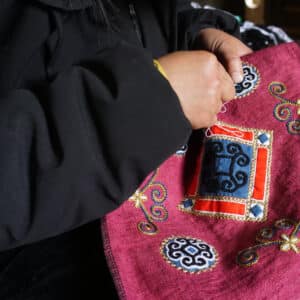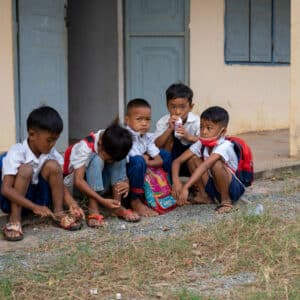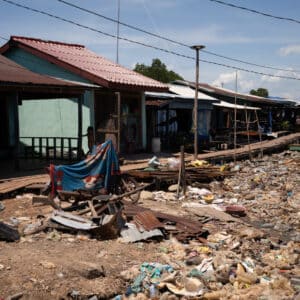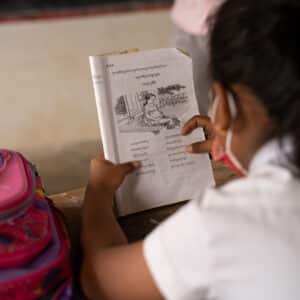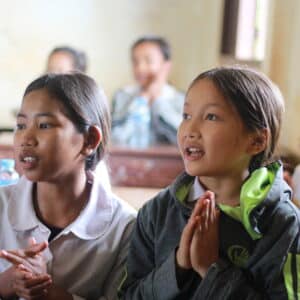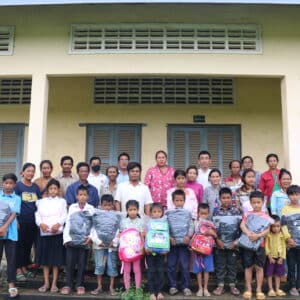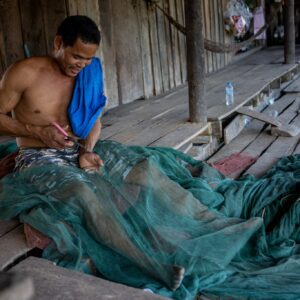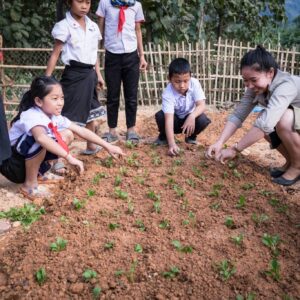In Pakchan – a small, rural village in Vientiane province, in The Lao People’s Democratic Republic (Lao PDR) – school lunchtime is not only the highlight of the school day for its 200 students, including 108 girls aged 3-12, but is critical to their development.
Sommathid Sisompheang, a 4th-grade teacher at Pakchan primary school, is currently responsible for the school lunch activities in her school and is one of the teachers going the extra mile to support children’s development. This responsibility has taught her a lot from nutrition knowledge to project management skills.
“I have learnt to plan the menu, which ingredients to purchase, how to cook, and how to manage the funds and time,” she said. “Since we started school lunches, teachers and community members in the village have learnt a lot, especially about ingredients and about having more variety in the menus we cook.”

In a country where malnutrition is one of the main causes of child mortality, school lunches can play a vital role in a child’s survival. According to UNICEF, and based on the Lao Social Indicator Survey II (2017), around 33% of children under the age of five in Lao PDR are stunted. Stunted growth affects the physical and cognitive development of children and stunted children risk not reaching their full potential as adults.
It begins with education
According to the international nonprofit organisation Save the Children, of the 14,000 children that die before the age of five in Lao PDR, over 40% of the deaths are prompted by malnutrition. Based on a World Bank analysis, the lack of dietary diversity due to poor child feeding practices is the main reason for the high rate of child malnutrition in the country. To address this, Aide et Action has been training parents and community members – many of them mothers – in nutrition, and health, as well as setting up school meals in pre-primary and primary schools. Once trained, these parents and community members are offered jobs as cooks in their children’s schools and play a key role in promoting the health and well-being of children at school and also at home as they take their newfound knowledge back to their families. Teachers at participating schools are also increasing their knowledge of nutrition.
Supporting children’s health and education and empowering women
When children have access to nutritious meals, their risk of being malnourished and stunted is lowered which in turn, promotes their physical and cognitive development, but it also encourages them to go to school. Research from Aide et Action revealed that 81% of the students taking part in the project reported that they preferred to eat at school rather than at home because the food was more nutritious, better tasting, and they enjoyed eating with friends.

Knowing that their children will have a nutritious meal at school is also a relief for parents, according to mother-of-three Pa Vang in Nongpor village, Vientiane province. “Having lunch at school makes me feel confident because sometimes when I go to the farm for a whole day, I know that my daughters can eat lunch at school,” says Pa Vang. “I don’t have a lot of money to buy good food, fruits and milk for my daughters so I am happy that they are benefitting from the project.”
Mothers like Pa Vang who take part in the project also play a key role in their community as they are working to make a difference for future generations and the project also empowers them as they develop their skills and knowledge. “I cook at the school twice a month but, whenever I am free, I also come to help out more because I am so happy to be part of the project,” says Pa Vang.
The impact of school closures
Aide et Action is working in 18 villages in Lao PDR to provide nutritious school meals to children in order to keep girls, and boys in school, and to support mothers like Pa Vang and teachers like Sisompheang. However, the current COVID-19 pandemic which has led to school closures has, in turn, led to a disruption of school meals in some schools. While income losses due to COVID-19 may also cause households nationwide to adopt negative coping mechanisms, with harmful effects on food quantity, we hope the training we’ve provided will ensure dietary diversity where possible. Since September 2021, despite the challenges of the pandemic, Aide et Action has persevered and organised school meals in some schools and will continue the project in other schools as and when they’re reopened.




